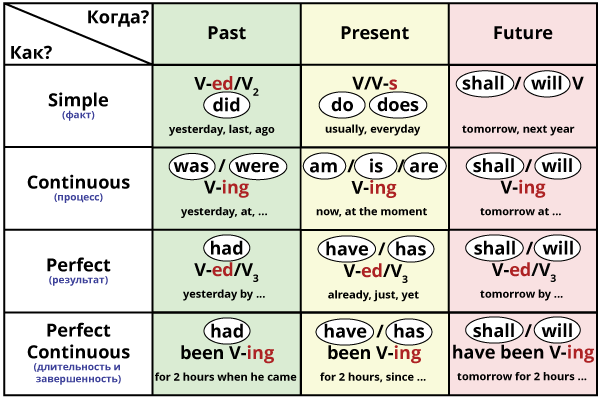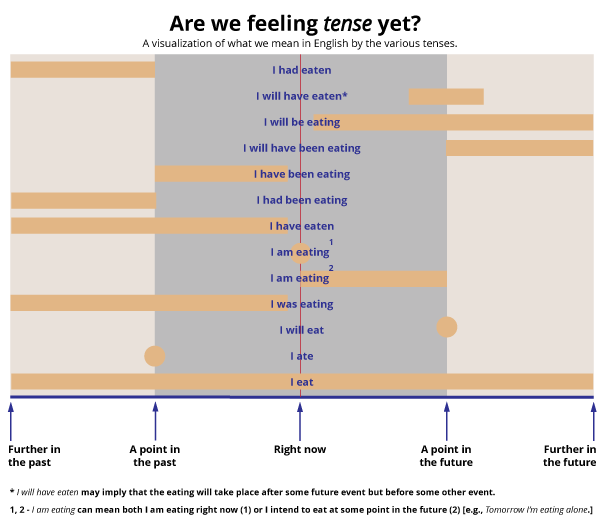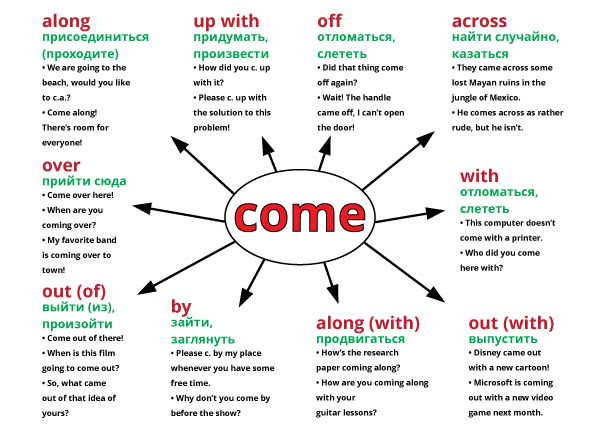Урок Time expressions Цели и задачи На уроке вы
 Скачать 157.87 Kb. Скачать 157.87 Kb.
|
|
Конспект урока Английский язык, 11 класс Урок № 3. Time expressions Цели и задачиНа уроке вы: будете практиковать употребление конструкции used to –be /get used to-would , фразовых глаголов с come, слов с предлогами for, about, to и форм настоящего, будущего и прошедшего времени глагола; научитесь использовать конструкции used to –be /get used to-would , фразовых глаголов с come, слова с предлогами for, about, to и формы настоящего, будущего и прошедшего времени глагола в устной и письменной речи. Time expressionsI want you to make sure that you’ll understand time expressions conceptually. Then you’ll have a general idea of expressions with some dependent prepositions and phrasal verbs. They make speech richer and more various. Would you like to know how to use them in your speech? ВАЖНО! The table from the image 3 reminds you the basic rules for using the present, the future and the past tenses. Повторить Grammar Reference GR 1 в учебнике. Кратко я предлагаю для использования таблицу времен. Она поможет выполнить упражнения:   Выполнить упражнения Task 1. Fill in the gaps with the correct form of the verb in brackets. Dear Diana, How wonderful it 1)…. (be) to hear from you! I 2)… (be) out of touch for so long and I really miss it! I’m happy to hear you were able to enjoy a nice autumn, followed by beautiful snow. It 3)….. (be) fairly mild here, too, although recently we 4)….. (get) freezing rain. Hopefully actual snow 5)….. (come) soon. This summer I 6) … (go) to Mongolia to meet my optimistic and outgoing girlfriend Kate. Speaking of her, she 7)…. (come) to visit me soon, so I’m looking forward to that. As for other news, my nephew Nick 8)….. (grow up) so fast. He 9)…… (be) free in November. It 10) …… (be) so sweet to hear him repeat things quizzically. Anyway, please 11)…… (send) me more news of you when you get the chance. Write back soon. All the best, Bessie Task 2. Fill in the gaps with the correct form of the verb (present simple or present continuous) in brackets. A: Why ……( you/smell) this flower? B: It ……(smell) fine. Where did you take them.? A:I……(see) my nephew tonight. B: I…… (see). So you won’t be coming to the theatre with us then, will you? A: I know you……(look) for a new place. B: Yes, it……(look) as if I’ m going to find a new place. A: We……(think) of travelling abroad. B: Oh, good for you! I……(think) that’s a good idea. 5 A: What’s up with Jack? He…….(be) usually in good mood. B: I see. He……(be) really sad today. Task 3. Fill in the gaps with the correct future tense of the verbs in brackets. I……(go) to visit my uncle. They are a bit nervous because they…..(move) to a new place. My sister……(graduate) from the university by the end of July. This time next week, she…..(go) to the US. My parents…..(visit) their friends this weekend. She … (meet) her classmate next Sunday. The money we get … ( just about pay) for the new car. Употребление конструкции used to –be /get used to-would Посмотреть видео, которое поможет разобраться с разницей между used to, would, get used to and be used to https://www.youtube.com/watch?v=-geb-HPYWpI https://resh.edu.ru/subject/lesson/3538/main/55631/ In the video, you’ve learned about the differences between used to, would, get used to and be used to and you’ve learned how to use them with confidence. Then you’ve read lots of example sentences and you’ve tested yourself. Remember: Used to is used in the past, but not now. Be used is used in the present, past, future tenses. Get used to (adopt to a new situation) Would=used Task 4. Choose the correct alternative When I was a child, I used to/was used to live in a small village. My granny would/was used to tell fairy tales when I was small. I am used to/used to getting up early. I used to /would go on holiday with my parents, but now I go with my friends. I didn’t use to/get used to wear jeans when I was a child. Whenever they met, they would/used to argue. It wasn’t difficult to get used to /use to living in the country. 3.Phrasal Verbs (come) Check in Appendix 2. The table from the image presents how to use phrasal verbs with COME.  Task 5. Fill in: down with, across, up with, into, over. 1 We came .... a beautiful antique table at the flea market. 2 Why don't you come ..... tonight? We're having pizza. 3 The symptoms show that you're coming.....the flu. 4 They come.... at least once a week for a visit. 5 The class came some ....... great games for the party. 6 She came ...... a large inheritance and bought a house. 4.Dependent prepositions Remember the following prepositional phrases: for fear of – из боязни, из опасений, из страха перед for life/for ever/for good – навек, на всю жизнь for the foreseeable future – на обозримое будущее for the time being – на настоящий момент, в данное время, пока что for granted – без доказательств for hire – напрокат, «свободен» – табличка на такси for nothing – даром, зря, за так for once – в виде исключения, на этот раз for smb’s sake – для кого-либо, ради кого-либо for the first time – в первый раз, впервые for the sake of – ради кого-либо/чего-либо for sure – точно, без сомнения, наверняка for donkey’s years – со времён царя гороха, вечность, «сто лет» to one’s face – глядя в глаза to one’s surprise – к удивлению to this day – до сих пор, на сегодняшний день, по сей день according to – согласно чему-либо/кому-либо contrary to – вопреки, против, в отличие от take exception to smth – обижаться, оскорбляться на что-либо Preposition “about” also means: ✓ “приблизительно, примерно” - About ten people were present.- Пришло около десяти человек. ✓ “почти” -“just about”, I have just about finished.- Я почти закончил. ✓ сомневаться в чем-то. There is no doubt about her ability Никто не сомневается в ее способностях озабоченный чем-то. I’m concerned about Simon. –Я беспокоюсь за Саймона. Task 6. Fill in: for, about, to. Check in Appendix 1. 1 I've always fett very dose ..... my older sister. 2 He has great respect.... his grandparents. 3 You should be ashamed ..... your behaviour. 4 She is very attached.....him. 5 What are you arguing ..... this time, you two? Task 7. Choose the correct alternative 1 .Everything shows that Ann is coming up with/down with the illness. 2. The students came across/ up with some popular games for the meeting. 3.Tom came over/ across a large inheritance and bought a new car. 4.They come into/at least two times a month for a visit. 5. I have been playing the guitar for/till two hours. 6.I always do it for/to my grandpa’s sake. 7.Do you see this book at/for the first time? 5.Sentence transformations Task 8. Complete the second sentence so that it means the same as the first. Use the word in bold. Use two to five words. 1 I could run fast when I was young, used I .... runner when I was young. 2 How long is it since they moved to the country? ago How ..... move to the contry? 3 Their flight will arrive at 7:45. due Their flight .....at 7:45. 4 This new hairstyle seems strange to me. get I ...........this new hairstyle. 5 Mary will get a promotion. sure Mary .... a promotion. ДОПОЛНИТЕЛЬНЫЙ МАТЕРИАЛ https://ru-clip.com/video/.../упражнения-на-used-to-would.html ) https://s-english.ru/uprazhneniya/used-to www.comfortenglish.com/used-tobe-used-toget-used-to-упражнения-с-ответами-inte.. gdzputina.me › 11 класс › Английский язык https://videouroki.net/razrabotki/english/test-2/11-class/ www.alleng.ru/d/engl/engl474.htm https://nsportal.ru/shkola/inostrannye.../09/.../test-k-uchebniku-spotlight-11-modul-1 niglus.com/gdz/11/1/478 testuz.ru/ https://moeobrazovanie.ru/online_test/angliiskiy_yazyk english-globe.ru/index.php?option=com_content&task=view&id=2647. https://www.ctege.info |
